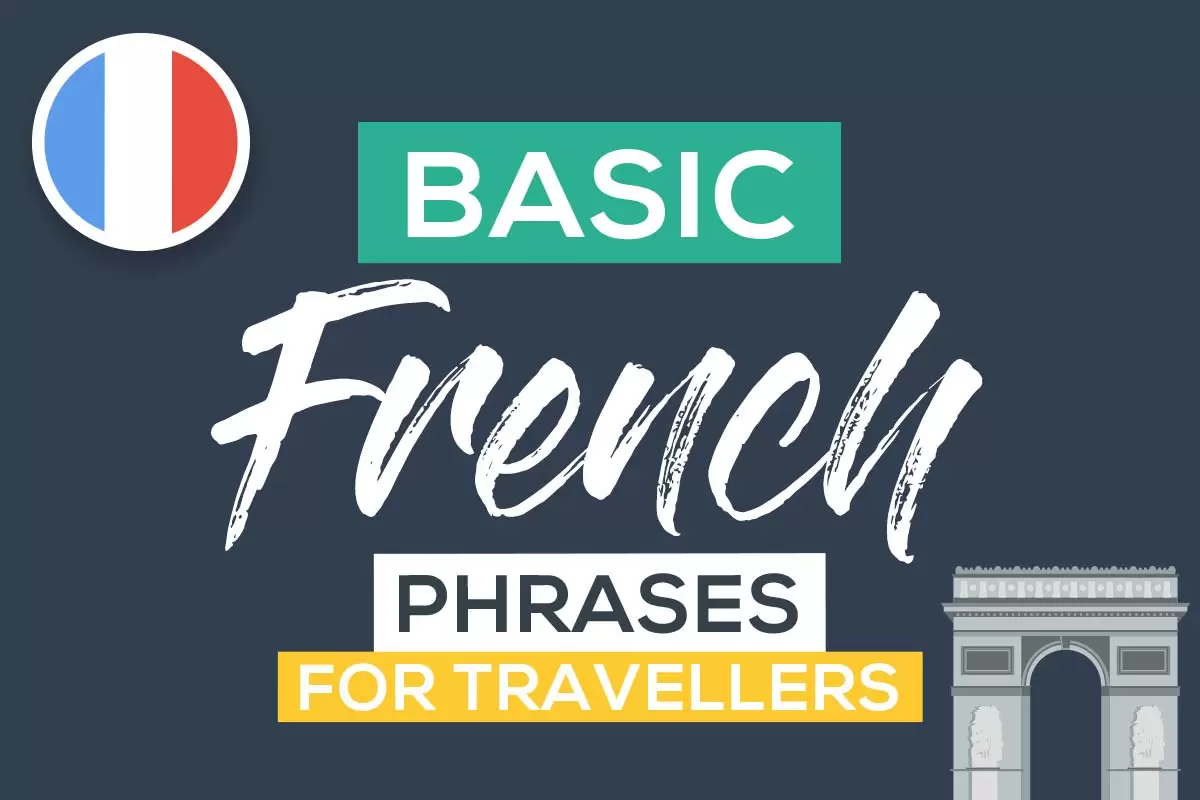Order your petit-déjeuner (breakfast) or buy your billets (tickets) to the Louvre all in French! Here are the most useful French phrases for travel you need to know.
Learning some French will offer you further insight into the French culture, mentality, and way of life. The ability to speak even un peu français (a little bit of French) and avoid making these French faux pas will enhance your travel experience and open the doors to unique connections with the locals.
France is the world’s top tourist destination, attracting more than 79,5 million visitors a year! That’s why French is the next language in my travel phrase guide series.
Not only that, but speaking French also comes in handy when travelling to Africa, Switzerland, Canada, Monaco, French Polynesia, the Seychelles amongst other places.
Why else should you learn French? Well, it makes learning other languages, especially Romance languages like Spanish, Italian, Portuguese and Romanian much easier.
Want to have fun whilst learning French? Struggling to find decent French language resources? I recommend getting uTalk. Available as a desktop site and app, uTalk is awesome for learning key words and phrases in French especially if you want to use it for travel purposes. It’s great for beginners getting started in a language and invaluable for intermediates looking to fill in gaps in their vocabulary and pronunciation.
What I love most about uTalk is that you can jump around their extensive library of topics and choose what you want to learn, when you want, and at your own pace. Because I believe in uTalk so much, I reached out to them and we’ve teamed up to offer you an exclusive 30% OFF reader discount across all of uTalk’s 140 languages! This offer isn’t available anywhere else! Click here to claim your exclusive 30% discount.
Let’s take a quick look at the French language so you’re a bit more clued up on its origin, use, and vocabulary.
I hope you enjoy this post as much as I enjoyed bringing it together. If you have any requests for other languages, let me know in the comments section!
Where is French spoken?

That’s a lot of Bonjour-ing!
French is the third most spoken language in Europe, after German and English and has official-language status in 29 countries, including: Belgium, Benin, Burkina Faso, Burundi, Cameroon, Canada, Chad, the Ivory Coast, the Democratic Republic of the Congo, Djibouti, Equatorial Guinea, France, Haiti, Luxembourg, Madagascar, Mali, Monaco, Niger, Rwanda, Senegal, Seychelles, Switzerland, Togo and Vanuatu. French is even one of six official languages of the United Nations.
It seems like nearly everyone wants to learn French, it’s the only language, alongside English, that is taught in every country in the world!
And the best way to learn it? Well, France operates the biggest international network of cultural institutes, which run French-language courses close to a million learners. My two favourite ways to learn French is by attending language classes – so I’m not only held accountable but also for the social aspect – and going on language holiday too!
A Brief History of the French Language

The French and English languages have a pretty mixed-up history. Following the Norman Conquest of 1066, Norman French was adopted as the language of power on the British Isles.
For the next 400 years, French was the language of the nobility and of most official documents. King Henry V put a stop to that when he went to war with France, but because the two languages existed in parallel for so long, the English language is peppered with words of French origin, many of which can be traced back to French roots. This means that you actually already know a lot of French, even if you don’t think you do.
Now for the tricky stuff!
French Pronunciation Tips

There is a total of 26 letters in the French alphabet. Standard French contains 13 oral vowels and up to 4 nasal vowels, but there are 5 additional accented letters that can be applied to change the sound of a letter.
Here are some helpful pronunciation tips:
Using Liaisons
One of the fundamental rules of pronouncing French (and many other Latin-based languages) is that everything has to flow. That’s one of the reasons why French sounds so beautiful.
If you’re speaking French correctly, everything should sound like a continuous melody.
That’s where liaisons come in.
Liaisons are a phonetic link between two words that may sound awkward if left unconnected.
Let’s take a look at some examples where they are used when speaking:
- After pronouns e.g. vous avez sounds like vooz-ah-vey not voo ah-vey
- Numbers and nouns e.g. deux amis sounds like derz-ah-mee not der ah-me
- One syllable prepositions e.g chez eux sounds like shez-uur not sheh uur
And liaisons that are forbidden when speaking:
- When using full names e.g.
- After et (and)
Liaisons may seem complicated at first, but they will become easier the more you listen to spoken French. After a while, you’ll automatically be able to notice where a liaison is needed (and where it isn’t) and how to make it sound natural when speaking.
What Not to Pronounce in French
Much like English, the French language isn’t written phonetically. The same sound can be represented by several different combinations of letters, and there are many cases of silent French letters. Two of the most well known are the silent “e” and the silent “h.”
The Silent “e”
The letter “e” is often silent in French, especially at the end of a word. Here are some examples:
Rue (road/street) is pronounced roo not roo-ee and inacceptable (unacceptable) is pronounced an-ah-sep-tah-bil not an-ah-sep-tah-ble
Of course, there are exceptions when it comes to masculine and feminine adjectives and nouns.
In the case of feminine adjectives and nouns, this typically means that the final consonant of the masculine form will now be pronounced. So, the masculine ouvert, meaning open in the masculine form and pronounced oo-ver, will become ouverte in the feminine form and pronounced oo-vert. The ‘e’ makes the final letter sounded.
The Final Consonant
As you’ve probably already noticed, there are a tonne of French letters that simply aren’t pronounced at the end of words. Don’t worry, you’ll get used to it!
In French, silent letters, or lettres muettes, have rules and exceptions just like many other linguistic concepts.
In general, the final consonants of a word are usually silent in French except in some cases of the letters c, f, l or r.
Just remember this simple rule, the consonants in the word ‘careful’ are always pronounced.
For example,
Avec (with) is pronounced ah-vek
Cinq (five) is pronounced saank
Hiver (winter) is pronounced ee-ver
The general rule regarding French word endings is that when in doubt, you probably don’t pronounce it. But, French is full of exceptions!
The Infamous “r”
For many English speakers, the French “r” can be a source of frustration. To pronounce it, you’ll need to use your throat and imagine you’re trying to gargle. The French “r” is pronounced in the same place as the English “k”, but with your throat closed.
The Silent “h”
As you’ve probably noticed from every French speaker’s failed attempt to say the word “hamburger” in English, the “h” in French is a silent letter no matter where it’s located in a word.
The only exception to this is when the preceding letter is “c,” in which case the “ch” combination makes a “sh” sound or “k” sound.
Here are a few examples of the silent “h”:
Le haricot vert (French bean) is pronounced leh ah-ree-coh ver
Huit (eight) is pronounced weet
Hiver (winter) is pronounced ee-ver
Vocabulary

Admittedly there are a few finicky grammar rules to learn, but generally speaking, English grammar corresponds relatively closely to French grammar.
Consider words in English that end with –ible and -able, these are the same in French, only the pronunciation changes. So, the French word ‘possible’ sounds like poss-ee-bleh and ‘comfortable’ becomes kom-for-tah-bleh.
Then we have English words ending in -ent and -ant which also come from French and have the same spelling and the same meaning. So, the word, différent sounds like diff-er-ohnt and important sounds like ahm-poor-tahnt. The ‘t’ at the end is just slightly sounded.
Had enough? Ok, one more! Words in English ending in -ary like contrary become -aire in French. So, ‘contrary’ becomes contraire and sounds like kon-trair.
There are so many rules like this, so you can see just how easy learning French can be.
Here are top 10 French Italian Phrases for Travel You SHOULD Know [& How to Use Them]
Top French Phrases for travellers
Want the infographic to take with you? Scroll to the bottom of the page.
Greetings
Essentials
Questions
Eating Out
Getting Around
Numbers
Days
Emergencies
**There are a few places that use unique words for the numbers 70 (septante) and 90 (nonante), such as Belgium and Switzerland. With the numbers 80 to 89, combine the number 4, the number 20, and the ones.
For example, in French 80 is four 20s, 81 is four 20s plus 1, and so forth. (Unlike most French-speaking countries, Switzerland actually has a word for the number 80. It’s huitante.)
Want more? Learn French with me, with Intrepid French!
Travelling to France? Don’t be treated like a tourist! Live your best travel experiences and learn France for less than the cost of eating at a tourist trap restaurant or a taxi driver who has “taken you for a ride”. In addition to my free French travel phrase guide, I’ve made it even easier for you to master the French language so you can create lifelong memories as you mingle with locals, get local tips, avoid tourist traps, and make new friends. Join my popular French course here.
Here’s what my students are saying:
Loved it, loved it, loved it. I’ve been trying to learn languages using various language learning apps for years now and although I know random words I feel no more confident in actually speaking the language than I was when I started.” – Basil Pereira
Click here more details and get instant access!
Have a laugh with these funny French expressions
Like it? Pin or download this French travel phrase guide
Like it? Pin it for later!
Learning French? Check out these French language guides
- Top 10 French Phrases You Should NEVER Say [& What to Use Instead]
- How to Sound More French: Top 10 French Phrases the French Love Saying
- How a ‘potato’ improved my French pronunciation
- 25 Funny French Idioms Translated Literally
- 22 Most Common French Grammar Mistakes [& How to Avoid Them]
Want to know more about learning languages? Start here!
- 6 Language Learning Tips: How to Learn a Language from Home
- What Type of Language Learner Are You? Your 4-Step Personalised Learning Plan
- 15 Top Language Learning Resources You Should Use
- 44 Best Movies on Disney Plus for Learning Languages
- 13 Ways to Seamlessly Integrate Language Learning into Your Daily Life
- 10 Pro Tips: How to Learn a Language with a Full-Time Job
- 7 Reasons Why You Should Go on a Language Holiday
- Essential Travel Phrases: How to be Travel Fluent in 10 Simple Steps
- 23 Cool Gift for Language Learners They Will Actually Use and Love
- How to Learn Your First Foreign Language in 8 Simple Steps: A Beginner’s Guide
- 11 Life-Changing Reasons Why You Should Learn a Language
- 42 beautiful Inspirational Quotes for Language Learners
- Language learning tips: 11 Polyglots Reveal The Secrets of Their Success
- Top 10 Best Ways to Learn a Language Better and Faster
- How Many Languages are there in the World?
Don’t miss my France Travel Guides
- How to Spend 4 Days in Paris: Ultimate First Timer’s Guide to Paris
- Where to Stay in Paris: A Fairytale Stay at Hotel Trianon Rive Gauche [Hotel Review]
- Where to Stay in Paris: A Decadent Stay at Hôtel Thérèse [Hotel Review]
Over to you!
Which of these French phrases are the most useful? What other languages would you like a travel phrase guide for? Have you been to a French-speaking country?
Let me know using the comments section below or join me on social media to start a conversation.
Thanks for reading and I hope you enjoyed this post.
Like what you see? Subscribe using the form below to have all of my posts delivered directly to your email.








6 comments
This is great. I took years of French when in school, 40-years ago and now want to re-learn and be able to get by when traveling. Merci
Hi! (Sorry for the Failures, I don’t speak english very well because I am french) My Name is Salomé and I am from France. I felt random on your Website and I watched you tables and the picture called ” French travel Cheat sheet “. What you’re doing is awesome because you help people open us to the World. I am proud of what you do. I want to help because I am a native speaker of French not of all the French (Canada, Belgium..) but from France. Salomé
Hey Michele, love the article, love the guide. I think there are some mistakes on the French spelling and pronuciation for the word Right.
Right =droite drrrwa (with the funny r for the French). Apart from that, what a precious website!! Well done!
Hi Monique, thank you for correcting this typo, I’ve just fixed it now 🙂
Hey Michele
This is so cool. Thanks for sharing it. I was I Paris about a month ago and these would have come in very handy. Keep up the good work.
Merci
Au revour
Thanks Basil, I’m so glad you enjoyed this post. I hope you’ll find it useful for future travels in Francophone countries 🙂